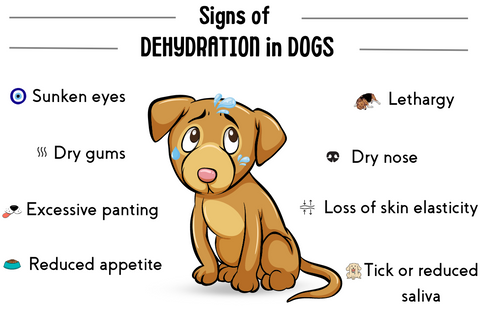How Long Can a Dog Go Without Water

Water is the essence of life, not just for us humans but for our furry companions as well. As devoted dog parents, especially those of us juggling the demands of work or navigating the journey of pet ownership for the first time, understanding our dogs' basic needs is crucial. One pressing question that often crosses our minds is: how long can a dog go without water?
This question becomes particularly pertinent as we try to balance our daily responsibilities with the welfare of our pets.
Let's dive into this topic to ensure our four-legged friends stay hydrated and healthy.
Understanding the Importance of Hydration in Dogs
Before we address how long a dog can go without water, it's essential to understand why water is so crucial for dogs.
Water facilitates every metabolic process in a dog's body, from digestion and circulation to joint health and temperature regulation.
A lack of adequate water can lead to dehydration, a condition that, if left untreated, can result in severe health complications and even be life-threatening.
How Long Can a Dog Go Without Water?
The answer to how long a dog can go without water varies depending on several factors, including the dog's size, age, diet, and the environmental conditions.
Generally, dogs should not go without water for more than 6–10 hours. This duration is a broad estimate and can differ based on individual circumstances.
However, it's a useful guideline for working dog parents or those new to pet ownership who might worry about their dog's hydration throughout the day.
Recognizing the Signs of Dehydration
Knowing how long a dog can go without water is one thing, but recognizing the signs of dehydration is equally important.
Symptoms of dehydration in dogs include:
- Lethargy
- Dry gums
- Excessive drooling
- Sunken eyes.
If you notice any of these signs, it's critical to provide water immediately and consult a veterinarian if the condition doesn't improve.
4 Strategies for Keeping Your Dog Hydrated
Let's see how you can maintain your dog hydrated.
1. Consistent Access to Fresh Water
Ensure your dog has access to clean, fresh water at all times.
If you're a working parent, consider an automatic water dispenser that can provide continuous access to water even when you're not home.
2. Hydration Checks
Make it a habit to check your dog's water bowl regularly to ensure it's full and clean.
This is especially important during hot weather, when your dog may need more water than usual.
3. Incorporate Water-Rich Foods
For dogs that are reluctant drinkers, incorporating water-rich foods into their diet, such as watermelon (in moderation and without seeds) or cucumber, can help maintain hydration.
4. Carry Water on Walks and Trips
Always bring along a portable water bottle or bowl for your dog during walks or trips. This is crucial, particularly in warm weather, to prevent dehydration.
Special Considerations for Different Dogs
It's worth noting that some dogs might have higher water requirements.
Active breeds, puppies, nursing mothers, and older dogs are particularly susceptible to dehydration and may need more frequent water breaks.
Additionally, dogs with certain health conditions, such as diabetes or kidney disease, require careful monitoring of their water intake.
In these cases, consult with your veterinarian for specific advice tailored to your dog's needs.
How Long Can a Dog Go Without Water When Ill?
If your dog is sick and refusing water, the concern becomes more urgent.
Dogs can become dehydrated much quicker when ill, especially if they are vomiting or have diarrhea.
In such scenarios, how long a dog can go without water is significantly reduced, and veterinary intervention may be necessary to prevent dehydration.
Final Thoughts for Dog Parents
As dog parents, our goal is always to ensure the well-being and happiness of our pets. Understanding how long a dog can go without water is a fundamental aspect of their care.
By ensuring they have regular access to water and monitoring their intake, especially in challenging circumstances like illness or extreme heat, we can safeguard their health and vitality.
Remember, while our busy lives might sometimes make it challenging to attend to every detail of our pets' needs, their reliance on us for basics like hydration is a poignant reminder of the trust they place in us.
By taking proactive steps to keep our dogs hydrated, we're not just caring for their physical needs, but also nurturing the bond we share with our loyal companions.
FAQ

How Long Does it Take for a Dog to Become Dehydrated?
A dog can become dehydrated within 24 hours if it doesn't consume any water, especially in hot weather or after intense activity. Symptoms can appear faster depending on the conditions.
How Do You Hydrate a Dog that Won't Drink?
Offer flavored water (like chicken broth), use a syringe to gently squirt water into the dog's mouth, provide ice cubes to lick, or mix wet food with water to increase fluid intake.
Can You Leave a Dog Without Water Overnight?
It's not ideal to leave a dog without water overnight. While many dogs can go 8–10 hours without water, ensuring constant access to fresh water is essential for their health.
Will a Dog Still Pee if Dehydrated?
Yes, a dog may still pee if dehydrated, but the frequency and volume will decrease. Urine may also appear darker and more concentrated.
Can You Treat Dog Dehydration at Home?
Mild dehydration can be treated at home by providing small, frequent amounts of water or ice cubes to lick. For severe dehydration, seek veterinary care immediately.
Does Wet Food Hydrate Dogs?
Yes, wet food can help hydrate dogs as it contains a high moisture content, around 75-80%, compared to dry food. It's a good option for dogs reluctant to drink water.
Can a Dog Go 8 Hours Without Water?
Most healthy dogs can go 8 hours without water, especially overnight. However, it's important to ensure they have access to fresh water before and after this period to prevent dehydration.






Leave a comment